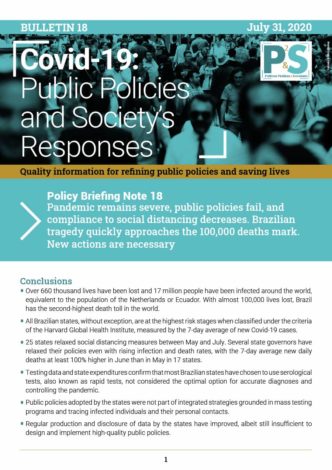Conclusions
- Over 660 thousand lives have been lost and 17 million people have been infected around the world, equivalent to the population of the Netherlands or Ecuador. With almost 100,000 lives lost, Brazil has the second-highest death toll in the world.
- All Brazilian states, without exception, are at the highest risk stages when classified under the criteria of the Harvard Global Health Institute, measured by the 7-day average of new Covid-19 cases.
- 25 states relaxed social distancing measures between May and July. Several state governors have relaxed their policies even with rising infection and death rates, with the 7-day average new daily deaths at least 100% higher in June than in May in 17 states.
- Testingdataandstate expenditures confirmthatmostBrazilianstateshavechosentouse serological tests, also known as rapid tests, not considered the optimal option for accurate diagnoses and controlling the pandemic.
- Public policies adopted by the states were not part of integrated strategies grounded in mass testing programs and tracing infected individuals and their personal contacts.
- Regular production and disclosure of data by the states have improved, albeit still insufficient to design and implement high-quality public policies.
- There was a gradual decline in compliance with stay-at-home orders by the population. Mobility levels in July remained practically the same from mid-March levels.
- The omission of the Federal Government in drafting a national strategy remains at the root of the states’ disarticulated responses and community behavior. The WHO recommendations were disregarded as well as the experience of the most successful countries for combating the pandemic.
- Although the results published in this Technical Note signpost a severe situation in Brazil, some policies can still be adopted to improve society’s response to the pandemic.
- The recommendations suggested in this Technical Note were inspired by countries with the best effective responses in controlling the pandemic and are in consonance with the recommendations of the Harvard Global Health Institute and the WHO.
- The Solidarity Research Network is aware of the enormous challenge ahead to promote the public debate as the country nears the tragic mark of 100 thousand Covid-19 deaths and believes in the urgent need for further engagement by society to demand better responses from public authorities.
Work group responsible
Coordination: Tatiane C. Moraes de Sousa (Fiocruz) and Lorena Barberia (DCP-USP)
Researchers
- Michelle Fernández (IPOL/UnB)
- Paulo Agabo (DCPUSP)
- Dara Aparecida Vilela (DCP-USP)
- Luiz Guilherme Roth Cantarelli (DCP-USP)
- Maria Letícia Claro (DCP-USP and CEPESP/ FGV)
- Anna Paula Ferrari Matos (DCP-USP)
- Natália de Paula Moreira (DCP-USP)
- Ingrid Castro (DCP-USP)
- Isabel Seelaender Costa Rosa (DCP-USP)
- Pedro H. de Santana Schmalz (DCP-USP and CEPESP/ FGV)
- Marcela Mello Zamudio (DCP-USP and CEPESP/FGV)
- Fabiana da Silva Pereira (DCP-USP)
- Vanessa Trichês Pezente (Fiocruz)
- Stelle de Souza (IPOL/UnB)
- Thiago Moraes (UNESP)


